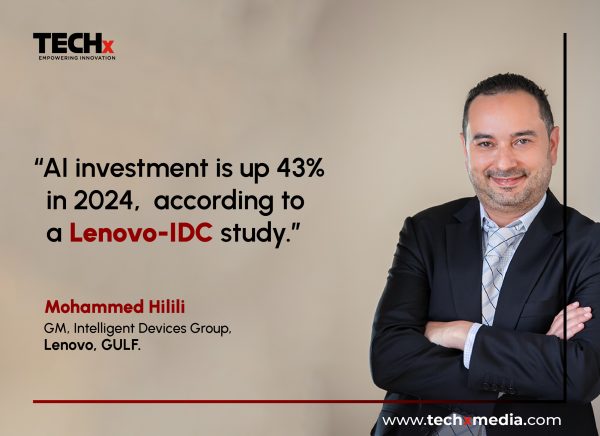
Mohammed Hilili, General Manager, Lenovo Intelligent Devices Group, GULF
The ‘Personal Computer’ despite its adoption as the most ubiquitous description in the technology space has never truly been about the personal. Sure, you may own the device, and for PC enthusiasts it remains the ideal way to express their technological taste with a bewildering range of accessories, and the ability to expand components to best suit their needs.
However, the Windows PC remains fundamentally the same at its core no matter how many extra gigabytes of RAM are added or the installation of the latest super powerful graphics card. This has been the case since PCs became the office’s dominant productivity product and increasingly the home’s central work and entertainment device.
This is all set to change in the coming years with Artificial Intelligence (AI). The AI trend is now on an upward curve with research from a joint Lenovo and IDC study finding that businesses are today investing more in AI technology, with an estimated 43 percent year-on-year growth in 2024.
This has set the stage for the existing paradigm to shift dramatically as AI combined with the automated process of Machine Learning (ML) ushers in the next evolution into the truly ‘personal’ computer. For the end user, this means they will interact with PCs that will understand their needs and tailor the experience to meet these requirements. In the simplest terms, it could mean adaptive workflows, whereby the computer pre-emptively opens or closes applications as and when required.
For instance, imagine a graphic designer’s PC that automatically adjusts screen color settings based on the specific type of project they’re working on, or a writer’s PC that reorganizes the desktop layout to display the most relevant tools and documents, optimizing the workspace for efficiency.
Does your client report need some final checks and proofreading to ensure good grammar and a well-written document? AI will do that for you once it detects your paper is written and will highlight the changes it has made. It will continually learn and adapt based on the user’s habits and preferences. But this is only scratching the surface of what AI will bring to the PC user experience in the coming years.
At Lenovo, we have anticipated these changes, and this is where our AI PC concept takes shape.
Laying the foundations for a new AI PC future
We believe that AI PC will develop in four key areas to deliver a truly customized experience for users. Personal foundation models are AI systems that adapt to a user’s habits thereby further enhancing the assistance they can provide through ongoing use. These models will boost productivity in tasks such as drafting content in the user’s voice, organizing and summarizing meetings, as well as making it easier to visualize complex data. These adaptations will be securely stored on the device and not transferred to the Cloud without the express permission of the user.
Our AI chip technology is based on a powerful ML algorithm that is continually learning and able to complete as varied tasks as monitoring frame rates to power level management. The chip has been designed for continual learning and improvement. The only input required from the user is to use their computer.
Customization through AI will also extend to hardware optimization. For example, gamers might see their PC automatically overclock the GPU during a high-performance gaming session and then dial it back down to conserve energy when the session ends. Similarly, professionals using design software could have the system dynamically allocate more memory and processing power to the application, ensuring smooth performance without any manual adjustments.
These AI PCs are also huge stores of knowledge. They dynamically build a database of information taken from various localized sources and the user’s inputs that over time expand into a unique storehouse of data tailored to the individual’s habits. With increased use, the PC will be able to predict and foresee a user’s actions based on their work and life schedule.
Perhaps the true beauty of such technology is that it will be subtle and intuitive to the user. So, no need for a degree in computer science to type in command prompts. Simply use the device and allow it to learn your behaviours, habits, and choices and it will adapt the experience to meet your needs.
Taking the lead
At Lenovo we are already well on course to usher in this new AI PC future. Our focus on innovative solutions that meet the ever-evolving demands of consumers through smart technology is a key driver in this journey.
For example, we’re integrating powerful processing capabilities and advanced AI-driven features to support effortless multi-tasking, gaming, and other productivity tasks. With voice command functionality, users can set reminders, control smart home devices, play music, and more, all while remaining focused on their primary tasks.
But this is only the start. Last year during our Tech World event we set out our vision for ‘AI for All’ where we pledged to invest a further US$1 billion in AI innovation as well as sharing our hybrid AI approach.
We believe firmly the key to this strategy is an ecosystem whereby public, private, and personal foundation models work in harmony. This is why we are collaborating so closely with industry leaders such as AMD, Microsoft, and others. This future requires a merging of hardware and software, which will unlock a truly personalized experience for individual users while giving businesses the ability to get meaningful insights from their data in real-time.
The future that AI has promised for so long is almost upon us and it will revolutionize the way we live, work, and play leading to greater productivity, creativity, and ultimately more enriched lives.